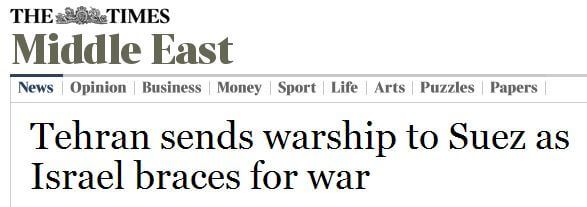A few thoughts on what I’m reading about the Iranian navy en route to the Suez Canal. Just as I was about to publish this post, I learned that Iran warships cancel request to transit Suez Canal.
A senior Suez Canal official says two Iranian warships have withdrawn their application to transit the waterway following expressions of concern by Israel over the plans.
The official said no reason was given for Thursday’s decision to withdraw the application. The official, who spoke on condition of anonymity because he was not authorized to speak to the media, also said it was not known if the vessels intended to transit the waterway at a later date.
First off, if you don’t think the incident’s a big fuss, J.E. Dyer explains how the Iranian warships have an outsize impact:
As Israeli authorities point out, moreover, Iran stated earlier that the naval task force would spend up to a year in the Mediterranean. Its base of operations is likely to be Syria, but triumphal port visits to Beirut are undoubtedly on Tehran’s to-do list.
The ships themselves are hardly impressive: one frigate with old anti-ship missiles and one barely armed replenishment ship. From that perspective, the reactions of global markets might seem excessive. These ships can’t fight a war. But the reactions are actually quite rational. The big shift here is in political perceptions of power. The important facts are that revolutionary, terror-sponsoring Iran — under U.S., EU, and UN sanctions — feels free to conduct this deployment, and Syria feels free to cooperate in it.
Then there’s the media coverage. Last night, I expected worse. But this morning, it was clear that whatever’s going on was meant to be an escalation, not an incident. So I was surprised by this alarmist headline in the Times of London:
On the other extreme, there’s AP’s early skepticism:
Israel’s foreign minister claims Iran is about to send two warships through the Suez Canal for the first time in years, calling it a “provocation,” but offering no evidence. The Egyptian authority that runs the canal denies it.
Israeli Foreign Minister Avigdor Lieberman said Wednesday the ships would cross later in the day, en route to Syria. He offered no evidence and did not say how he knew it.
Fortunately — for whatever reason — AP uncritically accepted P.J. Crowley’s statement.
State Department spokesman P.J. Crowley confirmed the presence of the ships in the area of the canal but would not say if that was considered provocative.
In any event, the incident seems to be closed — for now at least.


